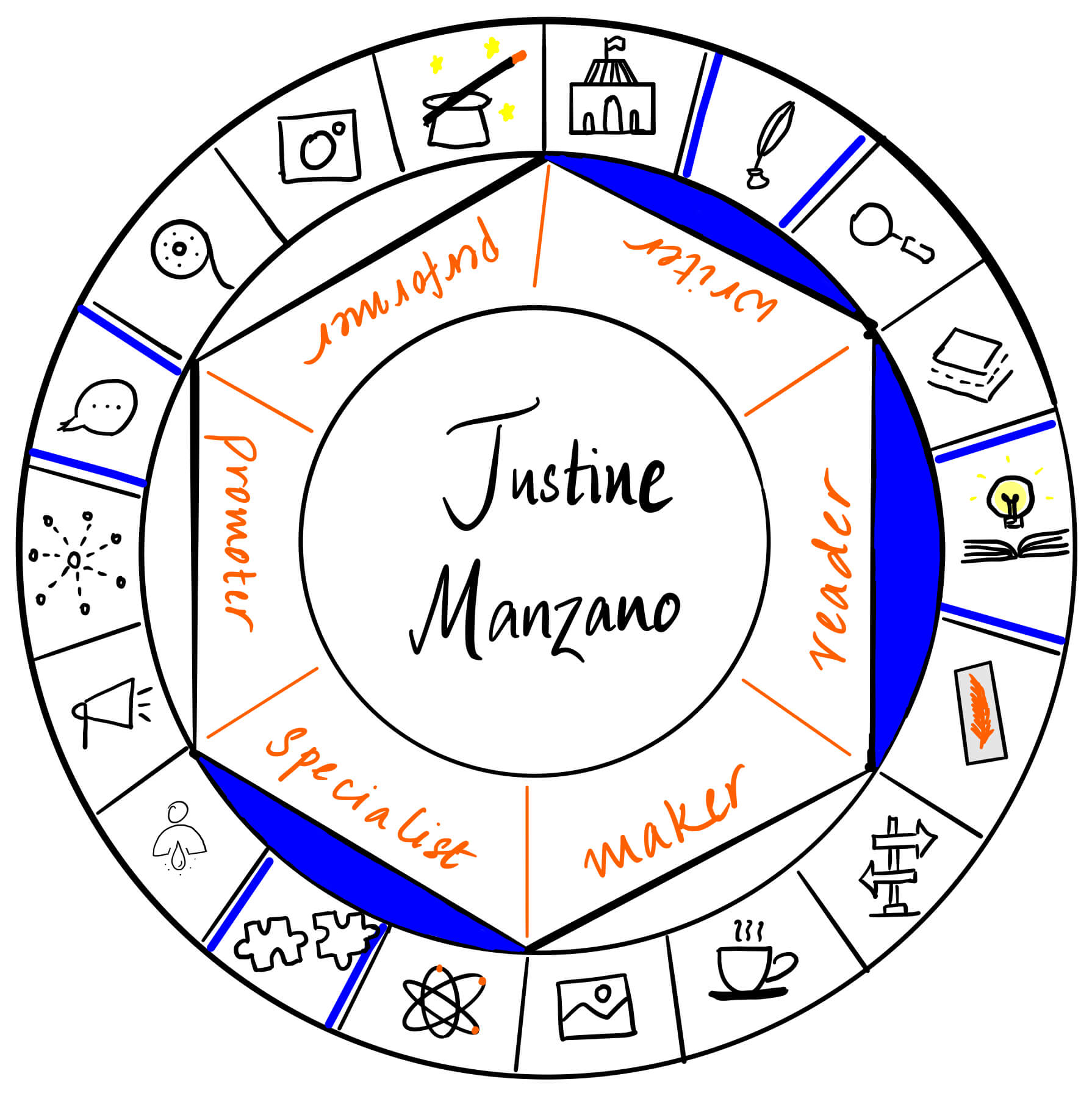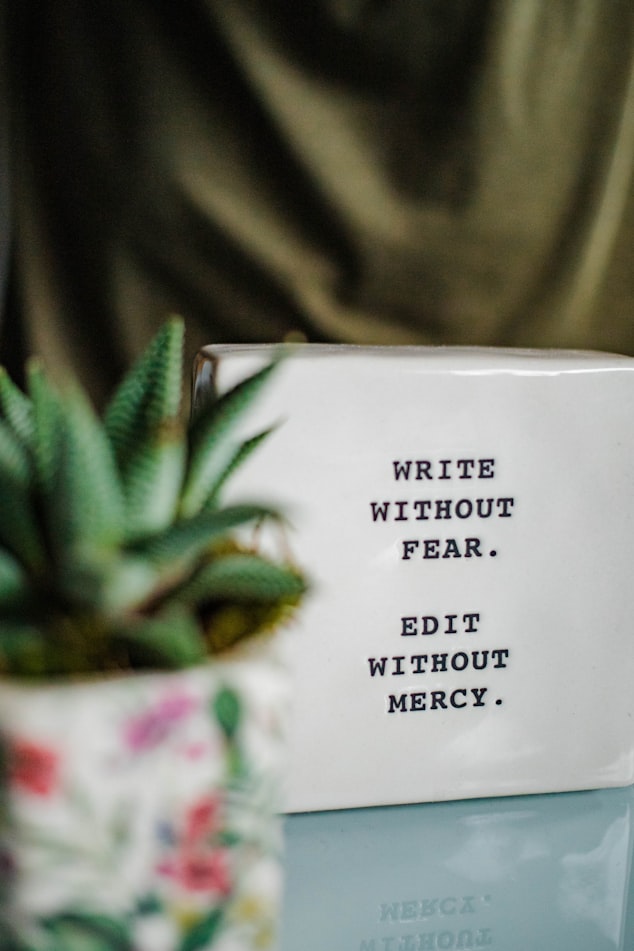
Welcome to another Creator’s Roulette, everyone! If you haven’t checked out my conversation with Jeni Chappelle about editing, please do because it will give some grounding for this one – I have Justine Manzano with me today. She is editor and writer and we will be talking about what she has learned from editing and brought to her writing. Her book, The Order of the Key, is out in July.
Welcome to Creator’s Roulette, Justine! What came first – the editor or the writer, for you?
Well, first of all, I just want to say that I love that introduction, because Jeni Chappelle is not just a fellow editor, she’s MY editor. And we never discussed the fact that we were both going to be on here, so I find that a funny coincidence.
Now back to the question you asked. The writer absolutely came first. I’ve been writing for most of my life, obviously with varying degrees of success. Even though I absolutely enjoy editing, writing is my true love.
On Editing
What motivated you to become a freelance editor?
It grew organically from my writing career. I went to college to pursue a degree in creative writing. With that came plenty of courses that involved critique groups and working through other people’s works. And as I grew in my writing career, I learned more and more about story structure and all the building blocks of storytelling such as plot and characterization. And as I learned more to apply to my own work, I would trade stories with other people for feedback and help them find their way when they were stuck with their stories. Before I knew it, I was being asked to edit work. It grew into my editing career.
I’m blessed in that I’m surrounded by creatives in my life. A few years ago, I came up with the idea of The Inkwell Council. The Inkwell Council consisted of myself, my writer/editor husband, and his sister, Megan Manzano, who is now a literary agent at D4EO. We had spent years providing deep edits to each other and others in our writing-loving circle and decided we wanted to do this for others. We started a monthly lottery where we’d critique the first three chapters of a book together from our unique perspectives. The way it started, I was the saleability person, Megan was the grammar person, and Ismael (my husband) was the developmental editor, as he is really good at asking questions that make you rethink EVERYTHING. Over time, not only did we learn new things from outside, we learned from each other. Before I knew it, I was the grammar person, and Megan was the saleability person, but we all just started doing each other’s jobs.
By the time our work and life situation made it so we could no longer take monthly free edits and needed to start charging for our work we could have all done the entire job on our own. We got to the point where our three person pile on, which was supposed to introduce new and appealing ideas per person, became the three of us agreeing with each other on 95% of our comments. Though Ismael will still pick up the plot hole literally nobody noticed. Even in published, acclaimed works—he’ll say things like “would they even say that? That didn’t exist in that historical lexicon.” Or “that phrase is based in a Christian upbringing and these people are from the completely invented planet of RX-8. Did they have Christ there?” And it will make you hate him. And love him.

All three of us eventually merged with CraftQuest, which was a great online editing collective, consisting of the three of us, Ari Augustine, and Maria Tureaud of Revpit fame. But eventually life won out, and we didn’t have the amount of time it took to not only pursue our own career goals, but also the collective. And there were whole periods of time where none of us could take edits through the collective because we were so busy individually. We had to disband, but we are still great friends and speak regularly. Maria just edited a short story for me and Ari just blasted me with a gazillion sites to find book bloggers for my upcoming release. They’re the kind of lifelong friends you truly can’t navigate this business without.
I’m back to taking solo work, and I still do joint work with my husband. It’s easier for us to open up for edits when we have time, without trying to keep a whole business afloat. And it really is so refreshing to read another person’s story and dig in deep to find the best way to tell the story they wanted to tell.
Sometimes, you can’t see the thing you’re missing. That’s what editors are for. And it’s a great writing exercise, too. Creativity breeds creativity.
I love your story! I have myself been part of a couple of group ventures that fell through eventually. During my teaching degree, I ran an online journal called The Teacher’s hat and had as many as 10 guest teacher bloggers on it for a couple months. It was great! So many strategies to discuss and write about. But summer ended and we all moved on. It hurt a lot to let that initiative go but eventually, I found something else – book blogging and Creator’s Roulette is what I am obsessed about right now. 🙂
We all have to change with time and sometimes that means letting go of the things we loved and learning and trying out new ideas.
Are there certain genres that you edit more than others?
Definitely. I do have pretty varied experience, but there are some things I gravitate toward. If I’m unsure about a story, I offer a five page sample edit so myself and the client can decide whether we work well together.
What I gravitate towards is anything with an element of weirdness to it. I love weird stuff. If a story has an odd twist to it, something that likely wouldn’t happen in real life, or something that may happen in real life that nobody really talks about (for instance, talking to yourself and getting a response, knowing you definitely have a ghost in your living room), I would love to help that manuscript shine. That doesn’t necessarily mean the story needs to be a Fantasy or Science Fiction novel, but I love those, so that works, too. I am also a firm believer in real life not being able to fit into genres, and love some kind of humor in everything, even if it’s gallows humor. Real people who experience trauma often laugh about it.

Though I love all books, I am definitely more interested in YA and above in age range. I love fantasy but not epic fantasy. I tend more towards urban/contemporary. I love light sci-fi. Hard sci-fi is a good read, but I was never a big enough science nerd to fact check science terms, or to be sure everything you say in that regard makes sense, so that will always be a difficult edit for me. I like to do full service work and hate when I can’t provide as many answers as I want. So I’m always up front about that.
I love contemporary romance, and anything with an LGBT+ influence is welcome. Historical books give me the same issue as hard science books. Again, these aren’t a hard no, but when I do take them on, I require a little more extra time to make sure I can provide real service. Diverse books of any kind are always welcome. I don’t even mind smut, as long as it’s well done, and I will pick it to itty bitty pieces. I’m a stickler in that regard. Sex scenes should be sexy and if I’m cringing, I will very openly tell the author that.
There are things that do get a hard no from me. I do not want to read work with detailed rape scenes or detailed child abuse as I find them triggering, and often, I think they’re done in service of the wrong ideas. This is a weird one for me, because there is a child character who was actively abused in the book I’m about to release. Although he’s eighteen at the point of the novel, there are scenes that harken back to what he experienced. So is it weird that I’ll write my own work with that theme, but find other people’s work on those topics triggering? It really depends on the depth. I can’t handle child sexual abuse in stories. Triggering as all hell to me. Physical abuse is different to me. I can handle it to an extent, which is strange because it’s closer to my own personal experience. If the abuse is a B storyline, and there aren’t long drawn out descriptions, I can handle it. If the abuse is the main storyline, I won’t risk it. It has the potential to seriously trigger me, and my mental health and maintaining that health is a big sticking point for me.
I won’t read animal abuse. I won’t read anything that pokes fun at abuse of any kind, because it is patently not funny. I’m cautious about anything that refers to a man as an alpha male, and judge books like those with these criteria: if the alpha male is an asshole and would likely be arrested for the way he treats the women in his life, the author should expect me to point that out readily throughout the manuscript. I can’t be swept away by a romance reading about a man like that. So I generally stay away from books like that.
Trigger warnings are a new territory for me and I am glad you mentioned them. I can’t think of any triggers for myself but the more I talk to people and hear their stories, like yours here, I understand where they come from. I started adding content notes to my reviews after the conversation about trigger warnings with folks in the Write hive.
I list my dislikes, not because I don’t think these books are or should be written, but because I think people who write those books also deserve a good editor, and I’m not the person who will be able to edit that kind of work effectively. When someone chooses me as their editor, I definitely want to be able to support that person to the best of my ability, and if I can’t make it through a scene without crying, I can’t be that person.
That makes sense and I bet people appreciate the honesty.
On Writing

How does the editor role differ from the writer?
I seriously have to shut off the editor role while I’m writing or I won’t write. Since I started editing full time, it’s so easy to see the problems with every story. If I think about that while I’m in the drafting phase of my project, I will not be able to write it. I will simply look at my outline and assume there is something wrong that I just haven’t found yet, or I’ll try to avoid rewrites and try to make it perfect from the get-go.
That will never work. If you’re an author, you need to be ready and willing to rewrite a novel a few times. You can’t expect everything to be perfect on the spot, because it will end up being extremely discouraging. In that way, I struggle with this often. There has to be a firm compartmentalization between the two sides of me, or I won’t be able to write.
The same goes for “Editor Justine.” There are things I wouldn’t write. But when I’m editing, that’s not my business. It’s not my job to decide how I would do it. It’s my job to make sure the client does it in the way that’s best for their story. It’s my job to find what works for them and make it shine. It would be too easy to tell an author to rewrite it the way I would do it. But that’s not effective work as an editor. So I have to close off the writer side of myself, and make sure the criticism and praise I’m giving is based on what is best for the story the client is telling, not what I would want to do as an author.
What genre do you write?
I write what I read. WEIRD STUFF. The release I have coming out is a YA Urban Fantasy. I’m currently writing its sequel. I have a story that’s out on query. It’s a YA Contemporary with a fantasy twist, because things just can’t be too normal or I won’t want to write it. I have plans for a YA Dystopian (I tend to write outside of marketing trends like it’s my job), a YA noir-style fantasy, a YA superhero tale, a YA romantic comedy containing a parallel imagined universe, and a potentially adult story about past lives. So yeah…all weird.
What are some lessons you have learned from editing other people’s stories that you have incorporated into your writing?
Really, the best thing I’ve learned is that if it doesn’t feel right, it probably isn’t working. Very rarely have I pointed out a potential plot hole that has made the writer gasp in shock. What I get more often is “I was worried about that part,” or “I had a feeling something wasn’t working there, but I couldn’t pinpoint what was wrong with it.”
I said I have to keep “Editor Justine” away from my writing or she’ll kill it, but that is one thing I let seep through. I won’t just shrug my way past something that feels wrong. I used to. And my critique partners and editors have almost always tagged those things as issues they had. So I’ve started to listen to that writer’s intuition more, because I’ve seen the way my issues with stories were often issues from the plotting stage that the author tried to work past because they didn’t trust themselves. I’ve seen it enough that I’m very careful about it.
Writer’s intuition – what more can you tell us about that? How can one learn to tap into it?
I feel like it comes from the same place as when people say not to think too much when you write. I think there are things we just know about stories. I was actually just discussing that idea with Jeni Chappelle (to bring it full circle) the other day. I’m not big on that rigid story structure idea. I really don’t understand it all that well. But instinctively, every story I write turns out that way. Because humans who enjoy stories, internalize story structure. We know that you need a good teaser to bring people in, because all our favorite shows have that portion before the theme song that makes us jazzed to watch. We know that end better be satisfying. We get bored in the middle if it’s not eventful enough. We know that, and so the three act structure is very intuitive. And a lot of these things are inherent.
The best thing a writer can do is tap into what we know about good stories and get the hell out of our own way.
What is something new you learned today from Justine and would apply to editing/writing?
Want to connect with Justine? Here are ways to find her : Website (for writing and editing information), Twitter and Instagram. Learn more about her book The Order of the Key here.

Photo by Nick Morrison on Unsplash
Spiral of books from Unsplash.
Image of editing an essay from Pixabay.
Write without fear image from Unsplash.

Be First to Comment